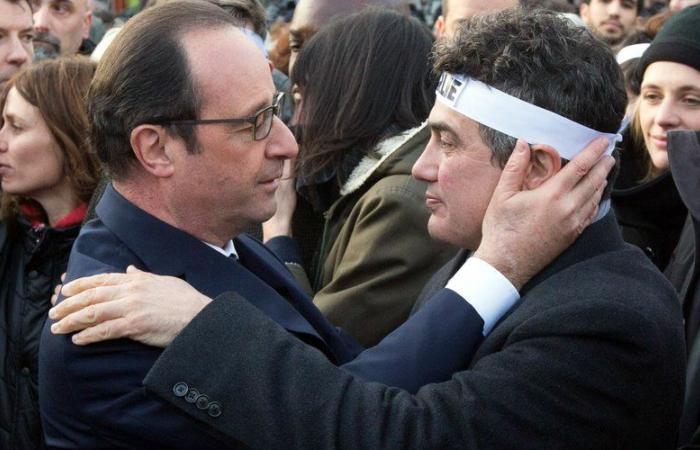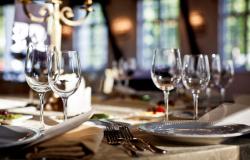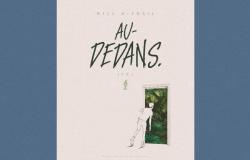
The former President of the Republic, at the Elysée during the attacks of January 7, 2015, looks back on the unfolding of the tragedy.
How did you learn that an attack had taken place against Charlie Hebdo?
I learned about it from the Minister of the Interior, Bernard Cazeneuve, who had learned of an attack on the Charlie site without us yet being able to measure the extent of the tragedy. A few minutes later, I had a testimony from the inside by Patrick Pelloux who was on site. He described to me in torrents of tears what he saw.
Today, what image or feeling do you keep?
Unfortunately, I experienced many attacks during my mandate. This one wasn't the first but it was the first that affected people I knew and a newspaper that was emblematic of a long period. Hara-Kiri, Charlie Hebdo… The period of the 70s and 80s played an important role for my generation. This attack is singular because it affects a newspaper, decimates cartoonists known to everyone, figures with whom I maintained friendly or cordial relations. As for Hypercacher, it is an anti-Semitic act which reminded me of the attacks that I experienced during the 2012 campaign and in particular that of Toulouse…
What memory do you have of the January 11 march? Why was it important?
I consider this march historic. It was the largest (more than 4 million participants) since the Liberation. It mobilized all the communes of France. It has hosted heads of state and government from around the world. It gave rise to a surge of fraternity. The police were saluted like never before. National unity was at its peak. As president, I was proud to represent a country capable of such consensus around the values of the Republic. It is this issue that we need to rediscover today.
Following the attack you wanted to set up a secularism day in schools on December 9. Do you believe secularism is threatened today in France?
Terrorism is both an act that stuns us in the moment and a venom that spreads throughout society. This poison is that of fear, doubt, suspicion and loss of common rules. Secularism has never been more necessary than when a society is fragmenting and freedom of expression so essential when threats appear with new technologies such as social networks. Secularism is rules that protect us. Today, secularism is contested by those who present it as an attack on religious freedom while it guarantees the existence of religions.
Who is secularism threatened by today?
By all those who think that this secularism is too rigorous. Is it not the Pope himself who asks for secularism to be more flexible? Now secularism is certainly a set of principles, which adapt to circumstances and developments in society, to the fact that there is religious pluralism, but these rules are not negotiable. Secularism is not simply freedom of conscience, it is also affirming that in a certain number of places religion has no place and there is nothing superior to the law of the Republic. No philosophy, no religion, no opinion, no conviction can be placed above it!
On June 12, during the press conference which launched the legislative campaign, Emmanuel Macron assured that certain political parties, on the far right and the far left, were a threat to secularism. What do you think?
Secularism is threatened by all movements that exploit religion. It is questioned by the Salafists who want Islam to be unassailable and that it can even impose itself in the public space. But without going that far, it is mistreated when voices are expressed to rebel against the fact that we can, for example, prohibit someone from fasting or dressing as they want. But secularism means imposing common rules over a certain number of times, school time for example, and in a certain number of spaces.
That day, Emmanuel Macron proposed the establishment of new republican rites, is that a good idea?
Republican rites mean learning the Marseillaise, respecting patriotic symbols like July 14, knowing our institutions… Can we have others? For example, a ceremony for the handing over of electoral cards would be a good idea. It can also be the establishment of citizens’ days during which everyone should learn the constitution and the principles of living together…
Charlie Hebdo, Hypercacher, like the attacks by Mohammed Merah in Toulouse and Montauban, are anti-Semitic acts… Since October 7, has the situation worsened?
It was already serious at the time of the attacks against Charlie Hebdo and against Hypercacher. Anti-Semitic acts and remarks led me to protect the synagogues and strengthen the fight. Since October 7 there has been a resurgence and the responsibility lies with those who confuse the relationship with Israel and the relationship with the Jews. Everyone can criticize the Israeli government as they wish, and there is reason to do so, but it is not acceptable to attack Jews because they are Jews. This is intolerable. Behind anti-Zionism, anti-Semitism is never far away. It must be remembered that in recent history, it is always the Jews who are the first victims of Islamist attacks.
Since the end of the Second World War, the dangers of anti-Semitism have been explained in schools, yet this feeling is returning with force among young people…
Because anti-Semitism has been deeply rooted in our societies for centuries. Added to this is a form of anti-Semitism which is linked to the situation in the Middle East which constructs a narrative where Jews are accomplices in blind repression and war crimes. Jews are always attacked because they are Jewish. Why were Jewish children killed in Toulouse and customers of the Hypercacher in November 2015? You must not let anything pass. Our compatriots are right to consider that our society is not reacting adequately to the threat weighing on them.
On January 7, a newspaper was also attacked. What is your assessment of press freedom today?
There is a subject of press pluralism, everyone knows their difficulties; social networks which carry unverified “information” amplify the vulnerability of traditional media. Finally, there is self-censorship, the fear of provoking or arousing violent reactions.
The Insoumis denounce insufficient protection of freedom of expression and demand the removal of the offense of advocating terrorism from the Penal Code. What do you think?
A law was passed during my mandate to continue the apology of terrorism. The application of this law has sometimes given rise to criticism because it is too extensive, but we cannot accept any tolerance with regard to terrorist temptations. So I don't think it's useful today to correct this law. In the period we live in, our fellow citizens are legitimately concerned about the seriousness of the threat.
For these 10 years since the Charlie Hebdo attack, would you, President, organize a special ceremony?
Ceremonies are necessary. 10 years later it was necessary to return to what happened during those days but what would be useful is to open a major debate on freedom of expression through general meetings which would bring together elected officials, journalists, media owners but also academics and spiritual authorities.





